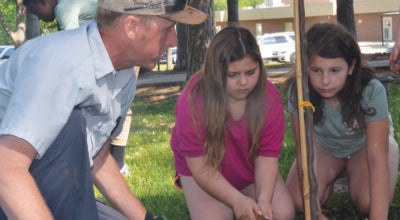Boys seeking big brothers
Published 8:57 am Thursday, July 27, 2017

- Jacob needs that special Big Brother.
By Shawan Gabriel
Special to the Enterprise
Charging fouls and blocking fouls are the most controversial calls in basketball. Go to any game and whenever these fouls are called, the crowd usually judges the call based on team allegiance.
But there are specific things that an official is supposed to look for when determining whether the foul is a block or a charge.
Taking a charge in basketball means that you saw where the play was developing and pro actively got in the way to alter the outcome. Taking a charge is a proactive defensive play that can change the momentum of a game. A blocking foul occurs when the defender is late to the spot and his feet are still moving. The referee sees this as the offensive player getting to the spot first, so the defender was simply in the way, or blocking, the offensive player from reaching the goal.
I believe that our choice to mentor others and how we go about that serves the same purpose as the charge/block foul rules. We are all players on the basketball court of life trying to reach the goal. This means that you have no choice but to either help others reach their goal or stand in the way of them reaching their goal. The difference lies in whether you pro actively take the charge to help others reach their goal or slide into position late and ultimately block them.
Charge Vs. Block
Did you get to the spot first? A mentor is proactive, so if you are taking the charge, then you must get to the spot first, or make yourself available to provide guidance and help. Getting to the spot first allows you to receive contact with those you are looking to help so that you can properly alter the outcome of the play for a positive result for everybody.
Are your feet set and planted? How solid are you in your position to help as well as your experience and knowledge? Though everyone qualifies to help someone, we must make sure that we are firm in our willingness to help and clear in how we can.
Every basketball coach in America will tell you that it’s impossible to take a charge with a weak position. You can’t be sliding into position, lunging with your upper body or flinching, and you must maintain this posture throughout the play. In other words, once you commit to taking a charge, you have to see it through until the end of the play, or it’s a block.
When we take the charge to mentor, we must be committed to our position through the entire play. There will always be detractors, thinking that you give too much of your time and resources. There will always be excuses for you to stop holding your position. Keep in mind that once you start, anything other than following through until the end means you’re blocking and impeding, and not taking the charge.
Your position in life does not determine the impact that you can make. In basketball, a charge represents a turnover, but for this analogy, I want to focus on being proactive and getting to a spot to alter the pending outcome.
Taking a charge means that instead of waiting for things to develop and coming in late, you’re proactive, stepping directly into the path of the action with the intent of making a positive change in the outcome.
A charge can be taken anywhere on the court, not just near the goal. This means that whether you’ve achieved your goals or you’re just starting your drive and are far from your goals, you still qualify to step in and take a “charge” in mentoring someone who’s less fortunate or is following in your footsteps.
For years, I have seen programs like Big Brothers Big Sisters use innovative and structured methods to pair experienced, vetted volunteers with people who long for their wisdom, companionship and assistance with life’s changes.
Using a tried and true model of one-to-one mentoring that has been greatly effective over more than 100 years, each scenario pairs a willing “big” with a “little” looking for guidance, support and accountability based on a number of factors, including common interests, background and available time. Even if you’re not linked with an organization like Big Brothers Big Sisters, there are opportunities to make a difference in the lives of others.
I can’t reiterate enough that an abundance of resources isn’t necessary to make a huge impact in someone’s life. You don’t need a lot of money or people to make a difference. Remember, taking a charge or being called for a blocking foul is always a one-on-one play. That means that typically no other players are involved besides the ball handler and the defender. With mentorship, it only takes two parties willing to participate to start the process.
Meet some of the Davie boys waiting for a Big Brother.
Ronnie would like to learn how to play the guitar and get better at math. He would like to have a Big Brother so he could have someone to play with. He enjoys hunting, fishing, sports and playing outside.
Jacob is a fun, outgoing and spunky young man. He enjoys playing video games, going swimming and being outdoors. Jacob loves his family and would like a Big Brother that enjoys sports and being outside.
William enjoys hunting, fishing, playing in the woods, “tinkering” and dwindling wood. He loves practical jokes and would like a Big Brother with a sense of humor.
Volunteer today at bbbsnc.org/davie or call 336-751-9906.





